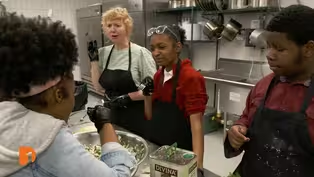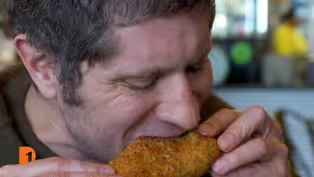
Keep Growing Detroit pursues food sovereignty, helps farmers
Clip: Season 9 Episode 22 | 7m 52sVideo has Closed Captions
Keep Growing Detroit pursues food sovereignty with a focus on access to fresh produce.
Keep Growing Detroit strives to cultivate food sovereignty for Detroit residents with a focus on providing access to locally grown fruits and vegetables. One Detroit’s Will Glover and Chris Jordan spoke with Keep Growing Detroit's Engagement Manager Danielle Daguio about the relationship between growing food and heritage and how Keep Growing Detroit supports Black farmers.
Problems playing video? | Closed Captioning Feedback
Problems playing video? | Closed Captioning Feedback
One Detroit is a local public television program presented by Detroit PBS

Keep Growing Detroit pursues food sovereignty, helps farmers
Clip: Season 9 Episode 22 | 7m 52sVideo has Closed Captions
Keep Growing Detroit strives to cultivate food sovereignty for Detroit residents with a focus on providing access to locally grown fruits and vegetables. One Detroit’s Will Glover and Chris Jordan spoke with Keep Growing Detroit's Engagement Manager Danielle Daguio about the relationship between growing food and heritage and how Keep Growing Detroit supports Black farmers.
Problems playing video? | Closed Captioning Feedback
How to Watch One Detroit
One Detroit is available to stream on pbs.org and the free PBS App, available on iPhone, Apple TV, Android TV, Android smartphones, Amazon Fire TV, Amazon Fire Tablet, Roku, Samsung Smart TV, and Vizio.
Providing Support for PBS.org
Learn Moreabout PBS online sponsorship(birds chirping) - Food is one of the most integral things that connects all of us and is one of the most important things in terms of culture, economics, and who we are as a people.
You can learn a lot about who you are by what you're eating.
- Growing food is one of the most meaningful things you can do.
Connects you to the land and its people.
And that's where I find meaning - Keep Growing Detroit started in 2013 and then one of our major programs, the Garden Resource Program, 10 years before that.
And so the main goal has always been about cultivating a food sovereign city, making sure that Detroiters are consuming vegetables grown by Detroiters.
And so one of the major ways that we do that is through the Garden Resource Program where we provide seeds, plants, support, additional garden resources and supplies, classes for people to get their gardens growing within Detroit, Hamtramck, and Highland Park.
I'm very proud to say that there are over 2200 farms and gardens within the city that are connected to our program.
That wealth of folks who are utilizing that space in that way is something that is uniquely Detroit in a way that I don't think many people associate with us, particularly since most folks think that we're the Motor City, we're an industrialized place, and we're sitting on, you know, over an acre of farmland right here in the middle of Eastern Market.
- Yeah.
From the gardens, how does that, I guess, ripple effect go into the community - When we say that we're a cultivating food sovereign city, it means that it's a way in which people have autonomy and accessibility to foods that they want to grow, foods that they want to eat, and they know how it's being grown.
In a way that they don't have to depend on a grocery store, in a way that they don't have to depend if they have money in their pocket to be able to do so, and a way that they don't have to see like, am I gonna be able to get this one thing that connects me to my culture, this one thing that connects me to who I am.
And so for me specifically, my parents came from the Philippines.
If I am away from my family, I'm away from like many people who look like me.
I'm away from like the language that I grew up learning.
If food is the way in which I can continue to connect with this major part of who I then let that happen.
And in addition, if it's a way in which I can grow it from seed, cultivate it, and see it be grown, it's an even deeper connection than if I had gone to the store to go and buy it.
When I found out that Ginger could be grown here, ginger is a ubiquitous thing in many of the Filipino foods.
But when I found out that it can be grown here and in this greenhouse, that made me feel like I can be here, I can be rooted here.
- What brought you to Keep Growing Detroit?
How'd you end up here?
- It has to do a lot with the community in Detroit.
I'm originally from Grand Rapids and a lot of barriers of access in farming are found in Grand Rapids that aren't found in Detroit.
And a lot of that has to do with the community in Detroit being so supportive of urban agriculture.
There's just more resources and programming.
You know, we have the Detroit Black Farmer Land Fund, we have organizations like Keep Growing Detroit that has the Garden Resource Program and a wide range of urban farms all across the city that are ready to support each other.
- So Juneteenth 2020, we launched the Detroit Black Farmer Land Fund in collaboration with Detroit Black Food Security Network and Oakland Avenue Urban Farm.
These three longstanding organizations focused on urban agriculture right here in the city.
It was born out of seeing many times over and over again white farmers in the city having capital and access to be able to own the lands where they are farming.
And in a city that's majority black, that's a major disparity, right?
The focus was to be able to say like, okay, you need capital and connections, let's do that for you.
Black farmers in the city who have been growing for decades in the same place but do not own it.
So many times, like what folks are facing is they're up against a developer, they're up against someone who has thousands of dollars of cash on hand who can outright buy that land.
So the land fund was created to be able to assist folks that they can have land security.
The fund, I'm proud to say is now in its fifth year.
- Oh wow.
- We have now awarded 171 awardees.
- Whoa.
- Hundreds of thousands of dollars.
- Yeah.
- Given, awarded, and I think about 18 acres that are now in the hands of Black farmers in the city.
- Just from my personal background, you know, it's like reclaiming the legacy that was lost for my ancestors that weren't able to, you know, freely work the land and build something on their own free will.
- What is different about farming in a major city like the city of Detroit versus farming in a rural area?
- First and foremost, we know that this is an industrialized city and one of the biggest values that we have as part of the Garden Resource Program is that every membership includes a soil test.
So we make sure that you know the lead levels are safe within the place that you're growing.
Then we do assistance for people who have community gardens to provide materials with raised beds.
Often I think you're talking about space and how much of that space you're able to grow.
- Most often, who are you seeing wanting to come and participate and learn how to grow, take this information back to their communities?
- It's everybody.
It's kind of amazing.
The folks I think that are really into it the most are the most seasoned senior folks who are in the community.
'cause they remember what it's like to grow up having a garden.
We take a lot of time additionally to focus on early childhood.
We work a lot with early childhood centers and create little gardens where they can include garden-based learning into their curriculum.
Then we also have a teen program where it's a youth apprenticeship program.
So our connection with growing Detroit youth talent where they come here for six weeks throughout the summer with an intensive program in learning all of this.
- What is the most gratifying thing about the work you're doing here at Keep Growing Detroit overall?
- The most gratifying thing is seeing that people can do it.
I think there's a lot of times people are like, "I can't do that.
I can't grow food."
And once people start growing their own food, people start to say things like, oh, I grew up eating this.
Oh this is something that my grandma used to grow in her backyard.
I haven't had this taste since they were alive, since they cooked that for me.
- Food sovereignty has to do with self-determination and self-determination leads to freedom.
And so when you're growing food on your own land, there's a sense of freedom that you don't normally have when you're going to the grocery store and buying food.
- These are folks who are taking urban agriculture very seriously in the city of Detroit.
And it has brought it to the forefront.
Farming is right here and we can do it here in City of Detroit.
Downtown Boxing Gym starts new culinary program for students
Video has Closed Captions
Clip: S9 Ep22 | 6m 4s | The Downtown Boxing Gym starts a culinary curriculum to teach children cooking skills. (6m 4s)
The history of Asian corned beef egg rolls in Detroit
Video has Closed Captions
Clip: S9 Ep22 | 6m 52s | The history of Detroit’s iconic Asian corned beef egg rolls, a Truly Detroit delicacy. (6m 52s)
Things to do in Detroit this weekend: November 28, 2024
Video has Closed Captions
Clip: S9 Ep22 | 1m 36s | Holiday-themed events and activities happening in and around Detroit this weekend. (1m 36s)
Providing Support for PBS.org
Learn Moreabout PBS online sponsorship
- News and Public Affairs

Top journalists deliver compelling original analysis of the hour's headlines.

- News and Public Affairs

FRONTLINE is investigative journalism that questions, explains and changes our world.












Support for PBS provided by:
One Detroit is a local public television program presented by Detroit PBS


